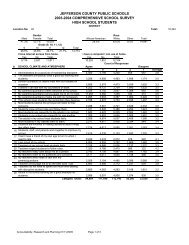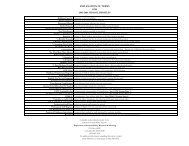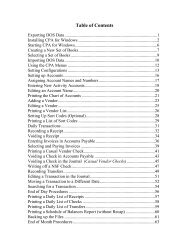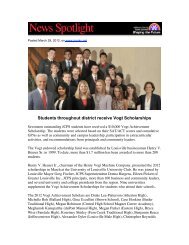May 2011 - Jefferson County Public Schools
May 2011 - Jefferson County Public Schools
May 2011 - Jefferson County Public Schools
Create successful ePaper yourself
Turn your PDF publications into a flip-book with our unique Google optimized e-Paper software.
Most Outrageous Cases v. Important Cases<br />
By: Brandon Grant<br />
Some very important cases have been ruled upon in the past few years, as well as some outrageous ones. I’ve<br />
collected a few of them for you to see that law can be very important, but also hilarious at times. Remember as you read<br />
that these cases, some of them have changed the history of law, so enjoy. Taken from: Top 5 Most Outrageous Cases and<br />
Supreme Court History: The First 100 Years.<br />
MAJORLY MINOR IRRITANT<br />
Some of us may remember Ed McMahon as the once lovable sidekick on<br />
The Tonight Show with Johnny Carson, but he's largely shed that image<br />
with a string of lawsuits that has reaped big rewards for the financiallychallenged<br />
entertainer. In addition to being sued for not paying his divorce<br />
attorney, McMahon has been known for his hobby of dishing out lawsuits<br />
himself, the most frivolous of which was against his home insurer over<br />
some mold that he blamed for contributing to the death of his beloved dog.<br />
At the time of the lawsuit, a serious hysteria had swept the delicate<br />
residents of Beverly Hills over the concern that a once minorily-irritating<br />
mold had mutated into something toxic. And despite the fact that the<br />
Center for Disease Control dispelled this myth, McMahon walked away<br />
with an astronomical $7 million dollar payout.<br />
1857 Dred Scott v. Sandford<br />
In Dred Scott v. Sandford (argued 1856 --<br />
decided 1857), the Supreme Court ruled<br />
that Americans of African descent,<br />
whether free or slave, were not American<br />
citizens and could not sue in federal court.<br />
The Court also ruled that Congress lacked<br />
power to ban slavery in the U.S.<br />
territories. Finally, the Court declared that<br />
the rights of slave owners were<br />
constitutionally protected by the Fifth<br />
Amendment because slaves were<br />
categorized as property.<br />
IT''S OVER 9000 CENTS!<br />
While most of us associate lawsuits with roundabout ways at nabbing enormous quantities of money? Some are all in it for<br />
the principle of the thing. This is the case with Canadian border guard Yves Julien who in December of 2003 filed a lawsuit<br />
against the border patrol for not reimbursing him on a $9 sandwich he paid for while working overtime. Though he was<br />
receiving the standard one-and-a-half pay for working overtime, Julien argued that the lack of money for meals was unfair.<br />
So he did the thing any normal person suffering from obsessive compulsive disorder would do. He decided to take his battle<br />
to the courts. The lawsuit spanned the course of five years and included numerous rulings, counter-rulings, counter-counter<br />
rulings and etc and infinitum before he was finally awarded his $9. Julien then proceeded to celebrate the victorious<br />
outcome of his 5-year-long battle by using the money to buy a six-pack of Labatt Bleu to drink alone and friendless in his<br />
darkened apartment.<br />
HOT COFFEE, COLD HARD CASH<br />
Perhaps one of the most famous cases of frivolous litigation was<br />
the 1994 lawsuit against McDonalds for brewing their java at<br />
dangerously hot temperatures which resulted in the injury of 84-<br />
year old woman Stella Liebeck. This led to a $640,000 payout to<br />
Liebeck and the case later became a "hot" topic for the debate<br />
about the rise of petty lawsuits in the early 90''s, and the ruling<br />
was so unexpected that McDonalds had previously denied multiple<br />
attempts to settle out of court, claiming they never expected to get<br />
in trouble for serving coffee "the way the customers like it."<br />
But at least one customer certainly didn't like it, though after the<br />
victorious lawsuit you might imagine her saying "I'm loving it."<br />
1896 Plessy v. Ferguson<br />
In Plessy v. Ferguson (1896), the Supreme<br />
Court considered the constitutionality of a<br />
Louisiana law passed in 1890 "providing for<br />
separate railway carriages for the white and<br />
colored races." The law, which required that all<br />
passenger railways provide separate cars for<br />
blacks and whites, stipulated that the cars be<br />
equal in facilities, banned whites from sitting in<br />
black cars and blacks in white cars (with<br />
exception to "nurses attending children of the<br />
other race"), and penalized passengers or<br />
railway employees for violating its terms.
















